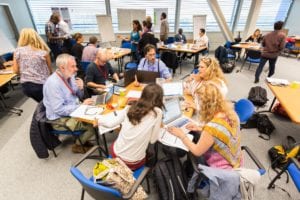Sphere extends a warm ‘thank you’ to all Handbook contributors

Handbook co-authors and experts meet in Geneva in 2017.
Sphere is truly grateful to all the humanitarian practitioners and experts who participated in the Handbook drafting process throughout 2017 and 2018, putting their time and expertise at the service of the humanitarian community.
The 2018 edition of the Sphere Handbook is the result of the most diverse and far-reaching consultation process in Sphere’s history. It was grounded in nearly 4,500 online comments received from 190 organisations, and more than 1,400 people participated in 60 in-person events hosted by partners in 40 countries. These contributions came from across the humanitarian sector, including local, national and international NGOs, national authorities, Red Cross and Red Crescent societies, universities, UN organisations and individual practitioners.
“It’s been amazing [to see] the people who’ve come out of the woodwork from agencies across the board to say they wanted to be part of it,” said Kit Dyer, adviser at Norwegian Church Aid and one of the authors of the Water, Sanitation and Hygiene (WASH) chapter.
“They’ve all been responding very positively and in time. That made me realise the real power of Sphere as a force to galvanise, or as a magnet to attract the best interest,” said Dr Unni Krishnan, Director of the Emergency Health Unit at Save the Children Australia and one of the Health chapter authors.
While the revision process was coordinated by the Sphere office, each of the chapters was developed by lead authors who were put forward by their home organisations, with support from thematic experts and resource people. Writing groups and reference groups were also established to support them in their work. This makes the Sphere Handbook a truly collective, voluntary effort.
“It was such a revolutionary concept that we could, as a community, come together and decide upon the best knowledge that’s available and any evidence that is out there on what we should be doing”, said Dr Eba Pasha, an independent consultant who co-led the drafting of the Health chapter. “To be part of the revision and discuss new standards was an exciting opportunity.”
A full list acknowledging all working group and reference group members is now available on the Sphere website.
- Browse the acknowledgements list
- Learn more about the consultation process
